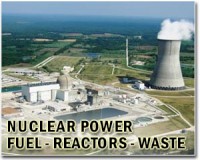 |
Vilnius (AFP) March 28, 2011 A communist-era nuclear power plant that Croatia shares with Slovenia is safe, Croatia's President Ivo Josipovic insisted Monday during a visit to Lithuania. "There are no official requirements to close this nuclear plant because it's very safe," Josipovic told reporters at a press conference with his Lithuanian counterpart Dalia Grybauskaite. "We are watching the situation constantly, and guarantees for our security and for the security of our neighbors are very firm," he added. Croatia has a share in a plant at Krsko, Slovenia, which came online in the 1980s when the two republics were part of Yugoslavia and provides 15 percent of Croatia's electricity. The plant was built with help from the United States, as Yugoslavia steered between the West and the Soviet Union. The facility, long under fire from environmentalists in neighbouring Austria, is back in the spotlight as the nuclear crisis in Japan raises jitters about the global atomic sector. The plant lies on European Union territory -- Slovenia joined in 2004 -- and so is subject to "stress tests" agreed last week by the 27-nation bloc. "The plant will be monitored and the details will be available to all. Croatia, just like its neighbour, has pledged to guarantee security and keep the public informed," Grybauskaite said. Lithuania has been pushing for checks on the nuclear industry to cover neighbouring non-EU nations, and has expressed repeated concerns about plans for plants in Belarus and Russia's Kaliningrad territory, near its borders. Lithuania shut down its only nuclear plant -- a communist-era facility -- in 2009 under the terms of its European Union entry. It aims to build a new one by 2020 with Poland and fellow Baltic states Latvia and Estonia. Lithuania is a staunch supporter of EU membership for other states from the former communist bloc, and Josipovic's visit focused on Croatia's drive to join the bloc. Croatia hopes to join the EU in 2012, and Josipovic reaffirmed that it aimed to wrap up accession talks by June this year.
earlier related report "We don't have any other alternative," Algerian Energy and Mines Minister Youcef Yousfi told the national assembly during a briefing on the energy sector. The minister, who was quoted by the state news agency APS, said Algeria "must prepare itself for this choice", noting that 10 to 15 years of studies would be needed before construction of its first nuclear power station. Japan's March 11 9.0-magnitude quake and tsunami, which has left at least 10,901 dead and 17,649 missing, also severely damaged its Fukushima nuclear plant northeast of Tokyo Radiation from the plant has wafted into the air, contaminating farm produce and drinking water as well as seeping into the Pacific Ocean, although officials stress there is no imminent health threat. Japan's nuclear emergency has prompted several countries to either order safety reviews, reassess their reliance on nuclear energy or in some cases shut down some of their aging facilities. Algeria has set a 2020 target date for construction of its first nuclear power plant, after which it plans to build a new station every five years. The country regularly experiences earthquakes, some of them major, including one of magnitude 6.8 which killed more than 2,000 people east of Algiers in May 2003, and another of 7.3 at El Asnam in October 1980 with a death toll of around 3,500.
Share This Article With Planet Earth
Related Links Nuclear Power News - Nuclear Science, Nuclear Technology Powering The World in the 21st Century at Energy-Daily.com
 German nuclear fears trigger Merkel party poll debacle
German nuclear fears trigger Merkel party poll debacleBerlin (AFP) March 27, 2011 Fears over the Japan nuclear crisis triggered a crushing defeat for Chancellor Angela Merkel's conservatives in their German heartland Sunday, as the ecologist Greens roared to a historic triumph. Merkel's Christian Democrats (CDU) have ruled wealthy Baden-Wuerttemberg, home to industrial giants Daimler and Bosch, for 58 years, but her on-again, off-again support for nuclear power spooked vo ... read more |
|
| The content herein, unless otherwise known to be public domain, are Copyright 1995-2010 - SpaceDaily. AFP and UPI Wire Stories are copyright Agence France-Presse and United Press International. ESA Portal Reports are copyright European Space Agency. All NASA sourced material is public domain. Additional copyrights may apply in whole or part to other bona fide parties. Advertising does not imply endorsement,agreement or approval of any opinions, statements or information provided by SpaceDaily on any Web page published or hosted by SpaceDaily. Privacy Statement |